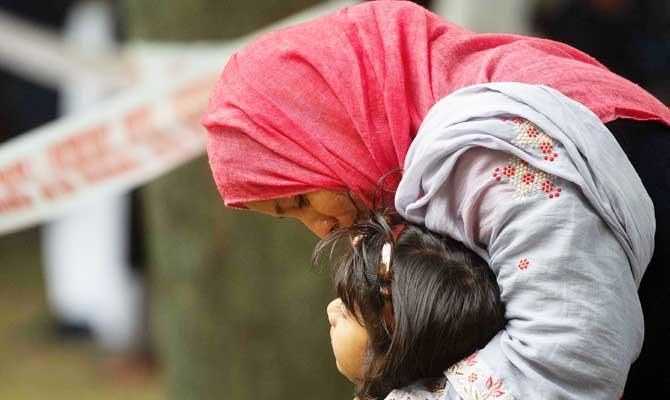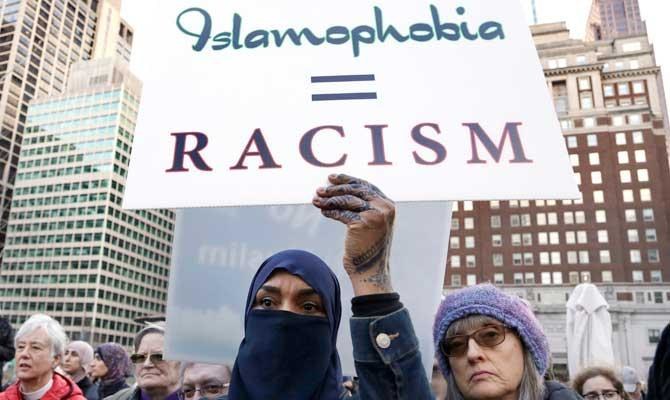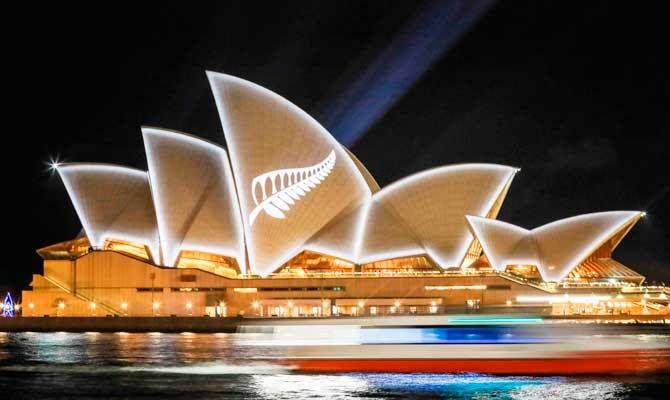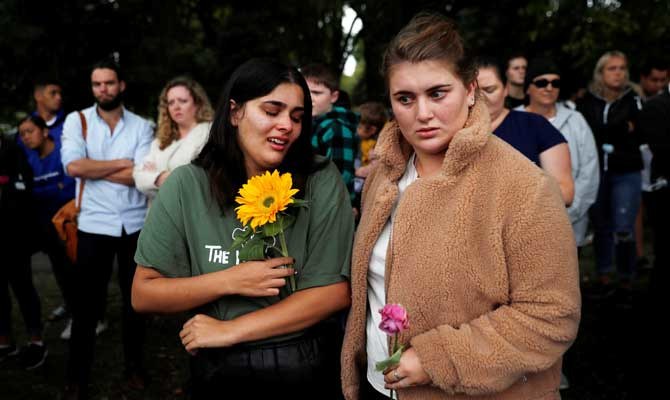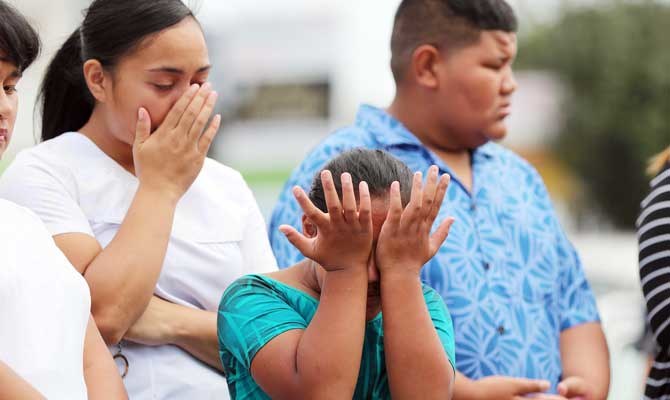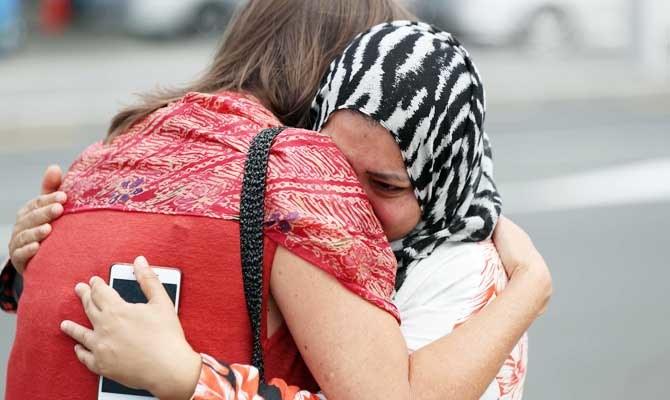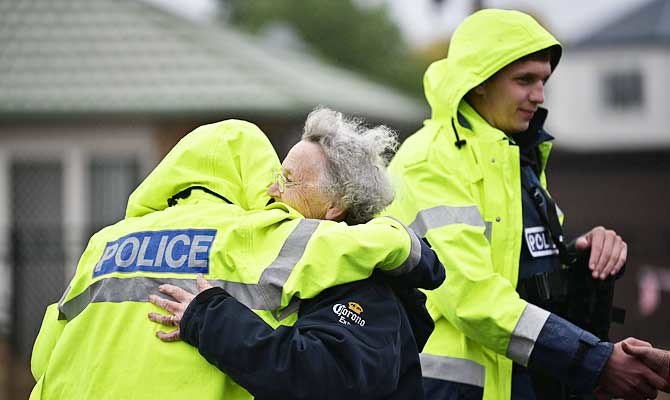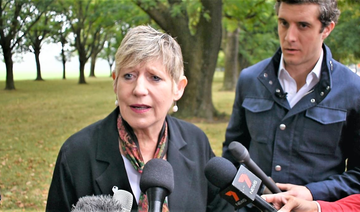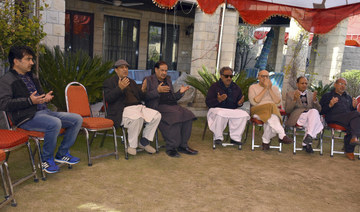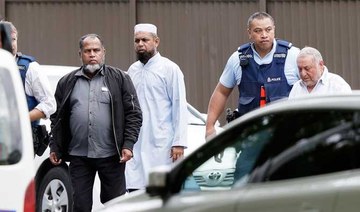CHRISTCHURCH: An attack on a New Zealand mosque took the lives of 50 worshippers Friday and left dozens more wounded when a white supremacist opened fire and live-streamed the shootings. Here are the stories of some of those killed and wounded.
THE DEAD
HUSNA AHMED
Farid Ahmed refuses to turn his back on his adopted home, despite losing his 45-year-old wife, Husna Ahmed, in the Al Noor mosque attack. They had split up to go to the bathroom when it happened.
The gunman livestreamed the massacre on the Internet, and Ahmed later saw a video of his wife being shot. A police officer confirmed she died.
Despite the horror, Ahmed — originally from Bangladesh — still considers New Zealand a great country.
“I believe that some people, purposely, they are trying to break down the harmony we have in New Zealand with the diversity,” he said. “But they are not going to win. They are not going to win. We will be harmonious.”
___
SYED AREEB AHMED, 26
Ahmed had recently moved from his house in Karachi, Pakistan, for a job in New Zealand to help support his family back home. On Saturday, Pakistan’s foreign ministry informed his family that Ahmed was among those killed during the mosque attack.
One of his uncles, Muhammad Muzaffar Khan, described him as deeply religious, praying five times a day. But education was always his first priority, Khan said.
Ahmed was an only son who had immigrated to New Zealand for work, his uncle said.
“Education had always remained his first priority,” Khan said. “He had gone to New Zealand recently where he got his job. He had only started his career, but the enemies took his life“
Family members, relatives, and friends have gathered at Ahmed’s house to express their condolences. His body is expected to arrive there in the coming days.
___
FARHAJ AHSAN, 30
The software engineer moved to New Zealand six years ago from the city of Hyderabad in India, where his parents still live, according to the Mumbai Mirror.
“We received the disturbing news,” Ahsan’s father, Mohammed Sayeeduddin told the newspaper Saturday. Friends and family had been trying to reach Ahsan since the attack.
Ahsan was married and had a 3-year-old daughter and infant son.
___
ABDULLAHI DIRIE, 4
Four of Adan Ibrahin Dirie’s five children managed to escape Friday’s attacks, but the youngest, Abdullahi, was killed, his uncle, Abdulrahman Hashi, 60, a preacher at Dar Al Hijrah Mosque in Minneapolis, told the New Zealand Herald.
Dirie also suffered gunshot wounds and was hospitalized. The family fled Somalia in the mid-1990s as refugees and resettled in New Zealand.
“You cannot imagine how I feel,” Hashi said.
He added: “He was the youngest in the family. This is a problem of extremism. Some people think the Muslims in their country are part of that, but these are innocent people.”
___
ALI ELMADANI
Elmadani and his wife immigrated from the United Arab Emirates in 1998. The retired Christchurch engineer always told his children to be strong and patient, so that’s what they are trying to do after the tragedy, his daughter, Maha Elmadani, told Stuff.
“He considered New Zealand home and never thought something like this would happen here,” she said.
She said her mother “is staying as strong as possible. My younger brother isn’t doing too well with the news.”
___
ATTA ELYAN
Atta Elyan, who was in his 30s, died of his wounds from the shooting, Muath Elyan, his uncle, told The Associated Press.
His father, Mohammed Elyan, a Jordanian in his 60s who co-founded one of the mosques in 1993, was among those wounded, said Muath Elyan, Mohammed’s brother, who said he spoke to Mohammed’s wife after the shooting.
Muath said his brother helped establish the mosque a year after arriving in New Zealand, where he teaches engineering at a university and runs a consultancy. He said his brother last visited Jordan two years ago.
“He used to tell us life was good in New Zealand and its people are good and welcoming. He enjoyed freedom there and never complained about anything,” Muath told the AP. “I’m sure this bloody crime doesn’t represent the New Zealanders.”
___
LILIK ABDUL HAMID
The longtime aircraft maintenance engineer at Air New Zealand was killed in the Al Noor mosque when he was killed, his employer said in a statement.
“Lilik has been a valued part of our engineering team in Christchurch for 16 years, but he first got to know the team even earlier when he worked with our aircraft engineers in a previous role overseas,” Air New Zealand Chief Executive Officer Christopher Luxon said. “The friendships he made at that time led him to apply for a role in Air New Zealand and make the move to Christchurch. His loss will be deeply felt by the team.
Hamid was married and had two children, Luxon said.
“Lilik, his wife Nina and their children Zhania and Gerin are well known and loved by our close-knit team of engineers and their families, who are now doing all they can to support the family alongside our leadership team and the airline’s special assistance team,” he said.
___
MUCAAD IBRAHIM, 3
At just 3 years old, Mucaad Ibrahim is the youngest known victim of the attacks. He was separated from his older brother Abdi and their father when the shooting began at the Al Noor mosque.
After an agonizing search by the family, Abdi said police finally confirmed that the toddler had been killed.
Mucaad was born and raised in Christchurch. He was beloved by the community, known for his energetic demeanor and easy laugh. He was bright and bubbly, and loved playing with an iPad.
Ahmed Osman, a close family friend, said Mucaad used to cheer from the sidelines as Osman and Abdi played soccer on Friday evenings at a park near the mosque. The little boy had planned to watch them play soccer as usual on Friday. He never made it.
Osman said the support of the community has helped the family pull through.
“New Zealand is always behind us,” he said. “Even when we walk down the street, people stop us and say, ‘Are you guys OK?’ That’s what New Zealand is about. It’s all about coming together. One person cannot stop us.”
___
This story corrects the spelling of Mucaad Ibrahim’s first name.
___
MOHAMMAD IMRAN KHAN
A handwritten cardboard sign outside Mohammad Imran Khan’s restaurant, the Indian Grill in Christchurch, on Sunday said simply CLOSED. A handful of pink flowers laid nearby.
The owner of the convenience store next door, JB’s Discounter, Jaiman Patel, 31, said he helped the staff with the keys after the terrorist attack that claimed Khan’s life.
“He’s a really good guy. I tried to help him out with the setup and everything,” Patel said. “We also put the key out for them when the terrorists come, and sorted it out for him.”
Khan had a son who was 10 or 11, Patel said.
The two were business neighbors who helped each other out when needed, he said.
“We are helping each other. It’s so sad.”
___
SAYYAD MILNE, 14
Milne was described as a good-natured, kind teenager. The high school student was at the Al Noor mosque for Friday prayers when the attack started, his half-sister, Brydie Henry, told the Stuff media outlet.
Sayyad was last seen “lying on the floor of the bloody mosque, bleeding from his lower body,” she said her father told her.
Sayyad’s mother, Noraini, was also in the mosque and managed to escape, Henry said. The teenager has two other siblings, 15-year-old twins Shuayb and Cahaya.
“They’re all at home just waiting. They’re just waiting and they don’t know what to do,” Henry told the news site.
___
JUNAID MORTARA, 35
Javed Dadabhai is mourning for his gentle cousin, 35-year-old Junaid Mortara, believed to have died in the first mosque attack.
His cousin was the breadwinner of the family, supporting his mother, his wife and their three children, ages 1 to 5. Mortara had inherited his father’s convenience store, which was covered in flowers on Saturday.
Mortara was an avid cricket fan, and would always send a sparring text with relatives over cricket matches when Canterbury faced Auckland.
___
HAJI DAOUD NABI, 71
Nabi moved his family to New Zealand in 1979 to escape the Soviet-Afghan war. Days before the shootings, his son, Omar, recalled his father speaking about the importance of unity.
“My father said how important it is to spread love and unity among each other and protect every member of the society we live in,” Omar told Al-Jazeera.
Omar told the news network his father ran an Afghan Association and helped refugees settle in to a new country.
“He used to make them feel at home,” Omar said.
___
HUSNE ARA PARVIN, 42
Parvin died being struck by bullets while trying to shield her wheelchair-bound husband, Farid Uddin Ahmed, her nephew Mahfuz Chowdhury told The Daily Star , a Bangladesh newspaper.
Chowdhury said Uddin had been ill for years and Parvin took him to the mosque every other Friday. She had taken him to the mosque for men while she went to the one for women. Mahfuz said relatives in New Zealand told him when the shootings began, Parvin rushed to her husband’s mosque to protect him. He survived.
The Bangladeshi couple had moved to New Zealand sometime after 1994, Chowdhury said.
___
NAEEM RASHID, 50, and TALHA RASHID, 21
As the shootings unfolded, Naeem Rashid is seen on video trying to tackle the gunman, according to Rashid’s brother, Khurshid Alam.
“He was a brave person, and I’ve heard from a few people there, there were few witnesses . they’ve said he saved a few lives there by trying to stop that guy,” Alam told the BBC .
Rashid’s son, Talha Rashid, is also among the dead. Pakistan’s Ministry of Public Affairs confirmed their deaths in a tweet .
The elder Rashid was a teacher in Christchurch and was from Abbottabad, Pakistan. His son was 11 when his family moved to New Zealand. He had a new job and planned to get married.
___
HUSSEIN AL-UMARI
An Iraqi who born in Abu Dhabi was killed in the attack on two mosques in New Zealand.
His mother wrote on social media that Hussein Al-Umari was killed.
His family and friends had been seeking information on Al-Umari, in his mid-30s, who had failed to return after going to Friday prayers at the Al Noor mosque in Christchurch.
His mother, an Iraqi calligraphy artist named Janna Ezzat, wrote on Facebook that her son had become a martyr.
Ezzat wrote: “Our son was full of life and always put the needs of others in front of his own.”
___
INDIAN CITIZENS KILLED
India’s ambassador to New Zealand issued the following names of Indian citizens who were killed in the mosque attacks:
— Maheboob Khokhar
— Ramiz Vora
— Asif Vora
— Ansi Alibava
— Ozair Kadir
Indian news reports said Alibava, 25, had moved to New Zealand last year after marrying Abdul Nazar.
The Indian Express newspaper said she was studying agriculture technology at Lincoln University and her husband worked at a supermarket in Christchurch. They got married in 2017.
The Manorama Online news site said her mother, Rasia, had prayed for the safety of the two when the news broke of the attacks.
Alibava used to call her family back in India every day, but they were worried when there was no call after the shootings. They later found out from the husband what had happened.
The report said she was hoping to find a job in New Zealand to support her family back home.
___
MORE PAKISTANI VICTIMS IDENTIFIED
Pakistan’s foreign ministry confirmed nine Pakistanis were killed in the Christchurch mosque attacks. They have been identified as follow:
Zeeshan Raza, his father Ghulam Hussain and mother Karam Bibi, Sohail Shahid, Syed Jahandad Ali, Syed Areeb Ahmed, Mahboob Haroon, Naeem Rashid and his son Talha Naeem.
Naeem Rashid and his son Talha Naeem, 22, died after trying to disarm the shooter.
Rashid’s brother Dr. Mohammad Khursheed, who lives in Pakistan’s garrison city of Abbottabad, received an emotional call from his sister-in-law telling him of his brother’s death. He died along with his son Talha Naeem .
Khursheed said his brother had already bought his plane ticket to Pakistan for a May family reunion. “He was very brave. He snatched the gun and I think he saved many lives,” Khursheed said.
Rashid had migrated to New Zealand in 2009. He was teacher here and same profession he had adopted there and so his wife.
Rashid’s 75-year-old mother Bedar Bibi was devastated and wanted to fly to New Zealand for a last look at her son and grandson. “I want the New Zealand government should take me there so I can have one last look of my beloved son and my grandson Talha,” she said.
The foreign ministry provided more information about other citizens who died in the attacks:
— Sohail Shahid, son of Muhammad Shabbir, age 40.
— Syed Jahanand Ali, age 34.
— Mahboob Haroon, son of Shahid Mehboob, resident of Rawalpindi, age 40.
___
THE WOUNDED
ELIN DARAGHMEH
A Palestinian woman says her 4-year-old daughter is fighting for her life while her husband is in serious but stable condition after being wounded in the mosque shooting.
Asmaa Daraghmeh, 27, said the family moved to New Zealand from Jordan four years ago when her husband received a permit to work as a hair dresser.
“It was a great opportunity,” she said, crying on the phone. “The country is safe, beautiful and hospitable.”
She spoke from the Auckland hospital where their daughter, Elin, remained in intensive care. Her husband, 33, was being transported to the same hospital.
Asmaa said she is a devout Muslim who was active in the mosque.
“Our life was great in this great country until this devil appeared and turned it to hell,” she said.
___
SHIHADEH NASASRAH
Shihadeh Nasasrah, 63, who was wounded in the New Zealand mosque shooting, said he spent terrifying minutes lying underneath two dying men as the gunman kept firing.
The assailant “would go out and bring more ammunition and resume shooting,” said Nasasrah, speaking by phone from a Christchurch hospital where he was recovering from two shots to the leg. “Every time he stopped, I thought he was gone. But he returned over and over again. I was afraid to leave because I didn’t know the safest way out. I died several times, not one time.”
Nasasrah had attended Friday prayers at the Al Noor Mosque with his friend, Abdel Fattah Qasim, 60, who was killed in the shooting. Both were originally from the West Bank — Nasasrah from the town of Beit Furik and Qasim from the town of Arabeh.
Nasasrah said about 200 to 300 worshippers were in the mosque for Friday prayers, and that he and his friend were sitting in the front, near the imam, or prayer leader. The imam was delivering the sermon when the gunman burst into the mosque, he said.
“Panic spread all over the place,” Nasasrah said. “Some started saying Allahu Akbar (God is great). We scrambled to leave toward a second door that leads to a hall and then to the street, but the bullets brought us down.”
“Two people came on top of me, and he (the gunman) approached us and opened fire. Both were killed and I felt them dying,” Nasasrah said. “I felt their blood. I myself was shoot and I thought ‘I’m dying’.”
He said he uttered the words that devout Muslims speak before their death — “there is no God but Allah, and Mohammed is his messenger.”
Nasasrah, a car dealer, said most of the worshippers were from Asia, including Indonesia, India, Singapore and Malaysia, and that Arabs made up a smaller part of the congregation.
The attack left him and other Muslims in the area worried and puzzled.
“I never heard a racist word in this country,” he said. “I don’t know what happened and why. I will not leave this country. Our lives are well established here, our homes, works, family is here and we will not leave.”
As a young man, Nasasrah studied English in the Syrian capital of Damascus, and then worked as a translator at the New Zealand embassy in Saudi Arabia for 14 years. The father of three moved to New Zealand in 1990. His three children graduated from universities in New Zealand and have established their lives in the country.
___
MUHAMMAD AMIN NASIR, 67
Nasir and his son were just 200 meters (219 yards) from the Al Noor mosque on Friday when everything went wrong. They had no idea that a white supremacist had just slaughtered at least 41 people inside the mosque. A car that had been driving by suddenly stopped, and a man leaned out the window pointing a gun at them.
They ran as the bullets began to fly. But at 67, Nasir could not keep up with his 35-year-old son. He fell behind by two or three fateful steps.
The gunman drove away. A pool of blood poured from Nasir’s body.
Nasir, who lived in Pakistan, had been regularly visiting his son in New Zealand.
He was on the third week of his visit when he was shot. He remains in an induced coma with critical injuries, though his condition has stabilized.
___
ADEEB SAMI, 52
As the rampage inside the mosque began, Sami was shot in the back as he dove to protect his two sons, Abdullah, 29, and Ali, 23, the Gulf News reported.
“My dad is a real hero. He got shot in the back near his spine in an attempt to shield my brothers but he didn’t let anything happen to them,” Adeeb’s daughter, Heba, 30, told the Gulf News.
Sami, described by the Gulf News as a Dubai-based New Zealander of Iraqi origin, underwent surgery to remove the bullet and his daughter said he’s recovering.
Stories of the victims of the New Zealand mosque attack
Stories of the victims of the New Zealand mosque attack

- The document provides the names of 44 men and four women, and so is missing the identities of two of the 50 victims confirmed as dead by police
- Another 34 victims remained at Christchurch Hospital, where officials said 12 were in critical condition
China’s Xi in Kazakhstan to cement ties

- Astana summit brings Xi together with Central Asian leaders
ASTANA: Xi Jinping celebrated China’s “eternal friendship” with Central Asia at a summit in Kazakhstan on Tuesday, as the Chinese leader blasted tariffs and sought to assert Beijing’s influence in a region historically dominated by Russia.
The summit in Astana brought together Xi with the leaders of Kazakhstan, Kyrgyzstan, Uzbekistan, Tajikistan and Turkmenistan.
Under Russia’s orbit until the fall of the Soviet Union in 1991, the five Central Asian states have courted interest from major powers including China, the European Union and the US since becoming independent.
At the summit, the group signed a pact of “eternal” friendship as Xi called for closer ties with the resource-rich region.
“We should ... strengthen cooperation with a more enterprising attitude and more practical measures,” said Xi in comments carried by state news agency Xinhua.
Central Asia is also seen as a key logistics hub, given its strategic location between China, Russia, the Middle East and Europe.
While Central Asian leaders continue to view Russia as a strategic partner, ties with Moscow have loosened since the war in Ukraine.
China has also shown willingness to invest in massive infrastructure projects in the region, part of its Belt and Road initiative that uses such financing as a political and diplomatic lever.
In a meeting with Kyrgyzstan’s president, Xi called for moves to “advance high-quality construction of the China-Kyrgyzstan-Uzbekistan railway and foster new drivers of growth in clean energy, green minerals and artificial intelligence.”
The five Central Asian nations are trying to take advantage of the growing interest in their region and are coordinating their foreign policies accordingly.
They regularly hold summits with China and Russia to present the region as a unified bloc and attract investment.
High-level “5+1” format talks have also been organized with the European Union, the United States, Turkiye and other Western countries.
“The countries of the region are balancing between different centers of power, wanting to protect themselves from excessive dependence on one partner,” Kyrgyz political scientist Nargiza Muratalieva told AFP.
China has now established itself as Central Asia’s leading trading partner, far outstripping the EU and Russia.
Construction of the Uzbekistan-Kyrgyzstan-China railway and the China-Tajikistan highway, which runs through the Pamir Mountains to Afghanistan, are among its planned investments.
New border crossings and “dry ports” have already been built to process trade, such as Khorgos in Kazakhstan, one of the largest logistics hubs in the world.
“Neither Russia nor Western institutions are capable of allocating financial resources for infrastructure so quickly and on such a large scale, sometimes bypassing transparent procedures,” said Muratalieva.
Kazakhstan said last week that Russia would lead the construction of its first nuclear power plant but that it wanted China to build the second.
“Central Asia is rich in natural resources such as oil, gas, uranium, gold and other minerals that the rapidly developing Chinese economy needs,” Muratalieva said.
“Ensuring uninterrupted supplies of these resources, bypassing unstable sea routes, is an important goal of Beijing,” the analyst added.
Belgium seeks to try former diplomatic official over 1961 killing of Congo leader

- If he goes on trial, Davignon would be the first Belgian official to face justice in the more than six decades since Lumumba was murdered
BRUSSELS: Belgian prosecutors said Tuesday that they were seeking to put a 92-year-old former diplomat on trial over the 1961 killing of Congolese leader Patrice Lumumba.
Etienne Davignon is the only one still alive among 10 Belgians who were accused of complicity in the murder of the independence icon in a 2011 lawsuit filed by Lumumba’s children.
If he goes on trial, Davignon would be the first Belgian official to face justice in the more than six decades since Lumumba was murdered.
A fiery critic of Belgium’s colonial rule, Lumumba became his country’s first prime minister after it gained independence in 1960.
But he fell out with the former colonial power and with the US and was ousted in a coup a few months after taking office.
He was executed on Jan. 17, 1961, aged just 35, in the southern region of Katanga, with the support of Belgian mercenaries.
His body was dissolved in acid and never recovered.
Davignon, who went on to be a vice president of the European Commission in the 1980s, was a trainee diplomat at the time of the assassination.
He is accused of involvement in the “unlawful detention and transfer” of Lumumba at the time he was taken prisoner and his “humiliating and degrading treatment,” the prosecutor’s office said.
But prosecutors added that a charge of intent to kill should be dropped.
It is now up to a magistrate to decide if the trial should proceed, following a hearing on the case set for January 2026.
“We’re moving in the right direction. What we’re seeking is, first and foremost, the truth,” Juliana Lumumba, the daughter of the former Congolese premier, told Belgian broadcaster RTBF.
The prosecutor’s decision is the latest step in Belgium’s decades-long reckoning with the role it played in Lumumba’s killing.
In 2022, Belgium returned a tooth — the last remains of Lumumba — to his family in a bid to turn a page on the grim chapter of its colonial past.
The tooth was seized by Belgian authorities in 2016 from the daughter of a policeman, Gerard Soete.
A Belgian parliamentary commission of enquiry concluded in 2001 that Belgium had “moral responsibility” for the assassination, and the government presented the country’s “apologies” a year later.
Japan’s Foreign Minister avoids sanctioning Israel, criticizes Iran’s nuclear “ambitions”

- “We do not permit Iran’s nuclear development, and we believe that solving this through discussion is crucial,” Takeshi stated
- “Moving forward, we will continue to exert all necessary diplomatic efforts”
TOKYO: Japanese Foreign Minister Iwaya Takeshi avoided condemning or approving sanctioning Israel in a press conference on Tuesday, shifting the emphasis onto Iran’s alleged pursuit of a nuclear weapon.
“We do not permit Iran’s nuclear development, and we believe that solving this through discussion is crucial,” he stated, emphasizing the potential for peaceful resolutions. “Moving forward, we will continue to exert all necessary diplomatic efforts to prevent further deterioration of the situation (between Iran and Israel.)”
When asked by Arab News Japan about the possibility of Israel using nuclear weapons in its conflict with Iran, as well as potentially targeting other countries like Pakistan and Egypt, as suggested by some reports, Iwaya opted not to answer directly. Instead, he stated, “Our country believes that the current tense situation in the Middle East is detrimental to the international community as a whole. We strongly urge all parties involved, including Israel, to exercise maximum restraint and to de-escalate the situation,” highlighting the urgency of the situation.
The Japanese Foreign Minister also said he strongly urged de-escalation when he spoke with Iran’s Foreign Minister on Monday, adding that Japan has “also been making efforts with Israel,” without specifying what those efforts entail or outlining how Japan might influence the situation. Rather, he emphasized Japan’s closeness to Israel.
“Israel is, of course, a friendly nation to our country, and we have had long-standing diplomatic relations with Iran, so we believe it is essential for Japan to work toward resolving issues through dialogue and consultation,” he stated.
“The peace and stability of the Middle East are extremely important to our country. The situation is becoming increasingly tense, particularly in Iran. We plan to raise the danger level further and issue evacuation adviseries for the Japanese for the entire country of Iran soon.”
Minister Iwaya was confronted about why Japan agreed with its G-7 partners to support so-called Israel’s self-defense and condemn Iran after Tokyo initially condemned Israel immediately when it launched a preemptive attack on Iran.
The Japanese Foreign Minister justified the change in the position, saying: “Initially, there were attacks from Israel that we condemned, but Iran retaliated, and this back-and-forth continues to this day. We believe that both Israel and Iran should ensure that they are engaged in dialogue and consultation to resolve issues.”
This situation is a source of significant concern for us, Iwaya continued. Regarding the G7 leaders’ statement, it is a consensus that reflects the discussions among the leaders considering the current situation. It reiterates the G7’s commitment to peace and stability in the Middle East.
700 foreigners flee Iran to Azerbaijan, Armenia; evacuation from Israel begins

- A Czech plane carrying 66 people landed in Prague on Tuesday a day after a Slovak plane had taken 73 evacuees to Bratislava from Amman
BAKU: More than 700 foreign nationals have crossed from Iran into neighboring Azerbaijan and Armenia since Israel began striking the country last week, government officials in Baku and Yerevan said on Tuesday.
The Caucasus countries border Iran’s northwest, with the closest crossing into Azerbaijan around 500 km from Tehran by road.
“Since the start of the military escalation between Israel and Iran, more than 600 citizens of 17 countries have been evacuated from Iran via Azerbaijan,” a government source said on Tuesday.
The evacuees, who crossed the border via the Astara checkpoint on the Caspian Sea coast, are being transported to Baku airport and “flown to their home countries on international flights,” the source said.
Among those evacuated are citizens of Russia, Belarus, Kazakhstan, Kyrgyzstan, Tajikistan, Uzbekistan, as well as Germany, Spain, Italy, Serbia, Romania, Portugal, the US, the UAE, China and Vietnam. Azerbaijan shut its land borders in 2020 due to the COVID-19 pandemic and has kept them closed ever since.
“In light of the evacuation need, Azerbaijan has temporarily opened its border for those leaving Iran,” the official said.
India also evacuated 110 of its citizens from Iran through Armenia, Ani Badalyan, Yerevan’s Foreign Ministry said. Poland’s Foreign Ministry said it would evacuate part of its embassy staff in Tehran via Baku.
“We have decided to evacuate or support the departure of staff who do not need to remain in the country, so-called non-essential personnel,” Deputy Foreign Minister Henryka Moscicka-Dendys said.
“Our colleagues will try to reach the border with Azerbaijan,” she said, without specifying how many people were involved.
Turkmenistan — one of the world’s most closed-off countries — said it had also allowed the transit of around 120 people evacuated from Iran through its territory, mainly citizens of Central Asian countries.
The Czech Republic and Slovakia have taken 139 people home on government planes from Israel because of its conflict.
A Czech plane carrying 66 people landed in Prague on Tuesday a day after a Slovak plane had taken 73 evacuees to Bratislava from Amman.
“I am glad they are all OK. The transport was really demanding in the difficult environment,” Czech Defense Minister Jana Cernochova said about the Czech flight on social media site X.
The Defense Ministry said most of the 66 evacuees were Czech nationals. “It was not possible to send the army plane straight to Israel,” the ministry said, citing the air-space closure.
“The evacuees were taken to the airport in the neighboring country by buses. They crossed the border on foot.”
Czech media said a convoy with the evacuees had left Tel Aviv on Monday morning and boarded the plane in Sharm El-Sheikh, Egypt.
A Slovak government plane with 73 passengers, mostly Slovaks, landed in Bratislava on Monday.
France urged to apologize for Polynesia nuclear tests

- Tens of thousands of people in the French overseas territory are estimated to have been exposed to harmful levels of radiation
- France conducted 193 nuclear tests in French Polynesia from 1966 until 1996
PARIS: Paris should apologize to French Polynesia for the fallout of nuclear tests there over three decades, which led to harmful radiation exposure, a French parliamentary report released on Tuesday said.
France conducted 193 nuclear tests in French Polynesia from 1966, especially at the Pacific archipelago’s Moruroa and Fangataufa atolls, to help build up its atomic weapon arsenal. These included atmospheric and underground tests which had severe health impacts.
Tens of thousands of people in the French overseas territory are estimated to have been exposed to harmful levels of radiation, leading to a significant public health crisis that has been largely ignored.
The tests remain a source of deep resentment in French Polynesia, where they are seen as evidence of racist colonial attitudes that disregarded the lives of islanders.
“The inquiry has strengthened the committee’s conviction that a request for forgiveness from France to French Polynesia is necessary,” the report said.
“This request is not merely a symbol, nor a request for repentance. It must be a... fundamental step in the process of reconciliation between French Polynesia and the State,” the authors said.
The report said the apology must be added to a 2004 law on French Polynesia’s semi-autonomous status.
Residents in the south Pacific Ocean islands are hoping for compensation for radiation victims.
The investigative website Disclose, citing declassified French military documents on the nearly 200 tests, reported in March that the impact from the fallout was far more extensive than authorities let on.
Only a few dozen civilians have been compensated for radiation exposure since the tests ended in 1996, Disclose said.


